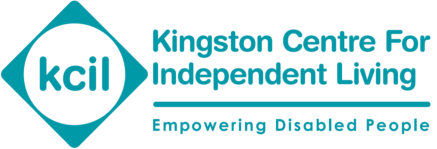Accessibility and Language – Person First and Identity First

by James Bassett
Access Facilitator
Find out more about KCIL’s Accessibility Services in our Accessibility Hub or email [email protected]
When we learn about a new subject, especially a delicate subject or one that involves a vulnerable or marginalised group within society, one of the first steps is to familiarise yourself with the appropriate language. The ways we choose to speak about a subject can profoundly influence how we as a society view the topic and so its important to make sure you’re doing so in a respectful and appropriate way.
However, within our own community there is frequently some debate about what type of language is the most respectful, whether we should refer to ourselves with Person First, or Identity First, language.
Person first language uses phrases such phrases as “Person with Disabilities”, to emphasize that above all else an individual’s personhood is what matters most. This serves as a reminder that the individual is defined by more than their disabilities and aims to ensure that, especially in clinical settings, that their personhood is not overlooked, and they are not simply treated as a project or medical puzzle to be solved.
Conversely, Identity First language uses phrases such as “Disabled Person”, in order to acknowledge the profound difference that living with an impairment can have on the individual and how it will have shaped and influenced their lives in a way unique to our part of the community. This is especially true for the Autistic and d/Deaf communities, amongst others, that are especially tight knit and support each other closely; informing behaviours and in many ways becoming a culture in itself – and in these cases they suggest that saying Disabled, Autistic, or d/Deaf person is a cultural description no different than saying English or Scottish person.

by James Bassett
Access Facilitator
Find out more about KCIL’s Accessibility Services in our Accessibility Hub or email [email protected]
With both types of language aiming to create positive change, and both having valid and positive arguments behind them it can be hard to decide which one is the most appropriate. At KCIL we follow the guidance of the Social Model of Disability, which recommends a mixed approach.
The Social Model recommends using the phrase “Disabled Person” in general circumstances because the word Disability itself has specific connotations – an Impairment only becomes a Disability when a lack of accommodations turns the impairment into a barrier that prevents the individual from being part of society. As such, while a person’s impairment may be permanent, whether it disables them is circumstantial, and as we strive to improve society and make it more accessible for everyone the number of instances where someone is disabled by their impairment should trend steadily downwards.
Social Model of Disability by Shape Arts
When not using the word Disability itself or speaking in a general sense, and instead speaking about the specifics of a person’s impairment or medical condition, the Social Model recommends using “Person with Impairments” or “Person with Mobility Issues”, for example, to always emphasise and acknowledge a person’s individuality above all else. However, as part of respecting each person’s agency the Social Model also recognises that some groups or individuals may feel more comfortable, or that it is more appropriate, to use alternative terms or even to prefer Identity First language, and that that choice should be respected.
In summary, based on the Social Model, KCIL recommends:
- Using “Disabled Person” when speaking in general terms, as being disabled is something done to you, when society does not make accessible accommodations.
- Using Person First language, such as “Person with Sensory Impairments” when talking about specifics.
- Respecting the choice of those who prefer to identify differently, such as the Autistic and d/Deaf communities.
- Not being afraid to ask if you are unsure.
- Not being afraid to make a mistake, so long as you accept any corrections graciously.
At the end of the day, so long as what you are saying comes from a place of respect and understanding, and you are willing to respect the individual preferences of those you are speaking to, then in most cases you’ll have no trouble.

